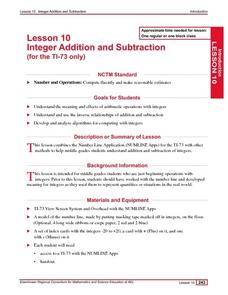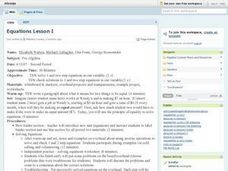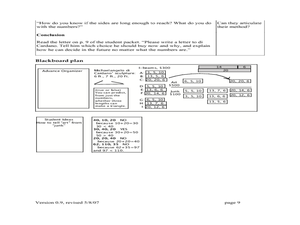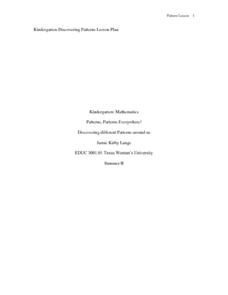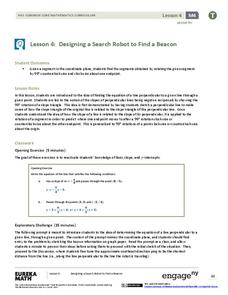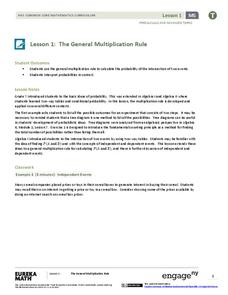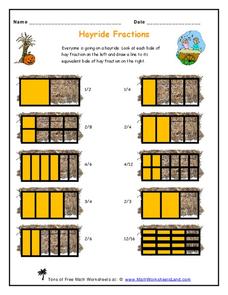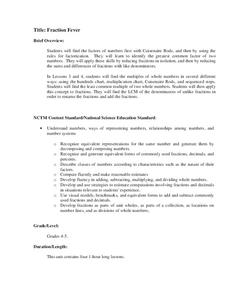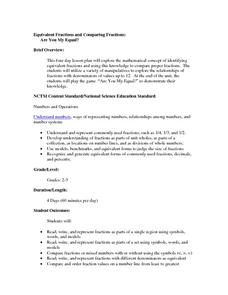Curated OER
A Penny Saved is a Penny Earned
Students explore the concept of exponential growth. For this exponential growth lesson, students manipulate power models with base 2. Students discuss what would happen if you doubled a penny over the course of 20 days. ...
Curated OER
Algebraic Manipulation
In this Algebra I worksheet, 9th graders evaluate algebraic expression by substitution. Problems include exponents and parenthesis. The two page worksheet contains thirty problems with answers.
Curated OER
Fair Exchange
Emma and her brother Sam exchanged some money. Was it a fair trade? Have your learners discuss all of the possibilities for the problem given. Consider having a sheet on the overhead or interactive board that provides all of the coin or...
Eisenhower Regioanl Consortium for Mathematics and Science Education
Lesson 10: Integer Addition and Subtraction (for the TI-73 only)
Using a number line on the floor made from masking tape and manipulatives, learners observe a demonstration of the addition and subtraction processes. After completing several worksheets, they solve three-term problems using calculators...
Curated OER
Equations Lesson 1
Middle schoolers engage in a study of equations and how they are solved using algebraic methods. This overrides the fact of guessing as done in earlier grades. They cover the concept of inverse operations as the main way to manipulate...
Tin Snips
Addition Hearts
Two hearts are better than one, I always say. Have your little ones use the numbers and images contained within these hearts to count and add numbers up to ten. There are four problems to solve. Because objects are included along with...
Curated OER
Prime and Composite Number Mini Lab
Elementary schoolers determine the attributes of prime and composite numbers. Pupils, working in pairs, participate in an activity in which they use manipulatives to show the rectangles that can be made from square tiles. They practice...
Curated OER
Multiplying and Dividing Decimals by 10. 100, and 1,000
Multiplying decimals by 10s, 100s, and 1,000s is easy once a student knows how to manipulate the decimal point. This short presentation covers this exact topic and does a good job of helping to show learners how easy it is to manage the...
Curated OER
Art or Junk? Discovering the Triangle Inequality
Middle schoolers study the triangle inequality. They will identify, compare, and analyze attributes of two and three-dimensional shapes. Then they develop vocabulary to describe the attributes. They also use manipulatives to analyze the...
Pennsylvania Department of Education
Shapes Around Us
Learners use manipulatives to study shapes. They sort shapes and use correct geometric terminology to describe them. Students find real-life examples of 2 and 3 dimensional shapes, and classify figures in their classroom according to...
Curated OER
Make Ten Guided Lesson
Use these missing-addend problems to help your beginning mathematicians practice addition facts. They read sentences and solve, making 10 from different single-digit numbers. Each of these four problems is formatted differently, so the...
CK-12 Foundation
Fundamental Trigonometric Identities: Tangent Identity
An identity that thieves can't steal the tangent identity. Scholars manipulate ratios to investigate the tangent ratio and connect it to the sine and cosine ratios. An interactive that uses color coding helps with this task.
Texas Woman’s University
Patterns, Patterns Everywhere!
Not only is pattern recognition an essential skill for young children to develop, it's also a lot of fun to teach! Over the course of this lesson, class members participate in shared readings, perform small group...
EngageNY
Three-Dimensional Space
How do 2-D properties relate in 3-D? Lead the class in a discussion on how to draw and see relationships of lines and planes in three dimensions. The ability to see these relationships is critical to the further study of volume and...
Center for Mathematics and Technology
Whole Numbers: Using an Area Model to Explain Multiplication
There are many ways to work through a multiplication problem. Using an area model, kids complete several worksheets with different types of multiplication problems, including multiplying by ten, and explain how the new strategies differ...
Curated OER
Rational Number Project
Infuse your unit on fractions, decimals, and operations with a thorough module about rational numbers. With a teaching guide, learner examples, templates for instruction, and lesson rationale, the module is a solid way to...
EngageNY
Designing a Search Robot to Find a Beacon
Build right angles using coordinate geometry! Pupils explore the concept of slope related to perpendicular lines by examining 90-degree rotations of right triangles. Learners determine the slope of the hypotenuse becomes the opposite...
EngageNY
Correspondence and Transformations
Looking for a strategy to organize the information related to transformations? The materials ask pupils to identify a sequence of rigid transformations, identify corresponding angles and sides, and write a congruence statement. They...
EngageNY
The General Multiplication Rule
In the first installment of a 21-part module, scholars build on previous understandings of probability to develop the multiplication rule for independent and dependent events. They use the rule to solve contextual problems.
Math Worksheets Land
Hayride Fractions
Ten bales of hay divided into equal parts. Which two bales of hay are equivalent to each other? Here, young mathematicians match equivalent bale of hay fractions to one another.
National Security Agency
Fraction Fever
This unit on fractions allows for upper-aged elementary learners to explore ways to find the greatest common factor and least common multiple of two numbers. Ultimately, young mathematicians will be able to identify equivalent fractions,...
Curated OER
Equivalent Fractions and Comparing Fractions
How can you tell if fractions have equal value? Use various collaborative activities to demonstrate the ways to determine whether or not fractions are equivalent.
EduGAINs
Introduction to Solving Linear Systems
Word problems offer class members an opportunity to learn the concept of solving linear systems using graphs. Individuals choose a problem based upon preferences, break into groups to discuss solution methods and whether there...
Balanced Assessment
Disc-Ness
Transform your scholars into mathematicians as they develop their own geometric definition. The task asks individuals to compare cylindrical objects and create a definition for the disc-ness of each object. They may use any method and...
Other popular searches
- Manipulatives Math Lessons
- Math Manipulatives Algebra
- Math Manipulatives Slope
- Math Manipulatives Multiply
- Manipulative's Math Lessons
- Math Manipulatives Division
- Math Manipulatives Coins
- Math Manipulatives Sets
- Math Manipulatives Grade 5
- Ab Patterns Math Manipulatives
- Using Math Manipulatives
- Math Manipulatives Geade 5



